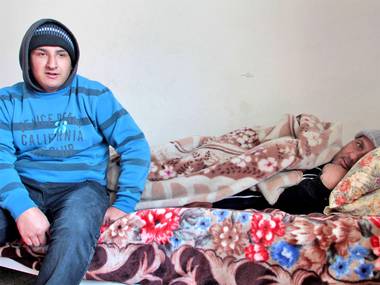Stories from the Old City: 'We are not living like human beings'
 Wednesday, November 30, 2011 at 06:06PM
Wednesday, November 30, 2011 at 06:06PM Catrina Stewart
The Independent
November 30, 2011 - 12:00am
A 60-year-old law is being used to evict Palestinian families and expand Jewish settlements in the coveted suburbs of East Jerusalem

At the top of a steep and ramshackle street in the Palestinian neighbourhood of Silwan, a rusty, battered gate opens into an unremarkable house. Less than a quarter mile away, though, stand the Al Aqsa mosque and the Wailing Wall, two of Jerusalem's most venerated holy sites, making it a very attractive piece of real estate indeed.
For Mohammed Sumarin, 52, whose late uncle owned this house, this is home. He was born here, raised here, and has never lived anywhere else. But now he faces losing his home of more than half a century to the Jewish National Fund (JNF), an Israeli charity that claims the house for its own and is battling to evict the family.
Silwan, sprawled along the southern flank of Jerusalem's Old City, is the politically sensitive epicentre of the struggle for East Jerusalem, coveted by Palestinians as the capital of their future state, and claimed by Israel, which annexed the eastern sector after the 1967 Six Day War, as an integral part of an undivided Jerusalem.
The evictions and demolitions of Palestinian homes in East Jerusalem are widely seen as deliberately aiding Israeli settlers in staking the Jewish claim to the eastern part of the city to thwart a final peace agreement that could cleave the city in two.
For the past month, the Sumarins have been living with the knowledge that they would have to leave their home by the end of the month or face forcible eviction. "We are not living like human beings," Mr Sumarin, a severe diabetic who is bedridden for much of the day, says. "We cannot sleep at night. We live in fear. We expect them to come at any moment and throw us out."

Waiting in the wings is Himnuta, the shadowy arm of the JNF, which declares itself the owner of the house. Himnuta, unlike the Fund, seeks to acquire property across the Green Line. Israeli and Palestinian activists fear that if Himnuta gets hold of the house, it will, as it has many times before, lease the house to El'ad, an extreme religious settler group that has established a bible-inspired archaeological park in the area and covets this neighbourhood for the Jews.
For the moment, though, the Sumarins can breathe a little more easily. Hours before an eviction order expired earlier this week, an Israeli judge suspended the ruling in response to a counter suit by the family's lawyer. It has given Himnuta until 18 December to decide whether it intends to go ahead with the eviction or not, amid mounting international pressure on the JNF to back down.
Like so many Palestinians who have lost their homes in recent years, the Sumarins are victims of an old Israeli law that allows the state to confiscate property of absentee Palestinian owners living in an "enemy" state following the creation of Israel in 1948. Problematically, the law predates 1967, when Israel captured the West Bank, and those states classified as enemy states include the occupied West Bank, Jordan (which signed a peace treaty with Israel in 1994) and almost every other Arab nation.
When the owner of this house – Mr Sumarin's uncle – died in 1984, somebody spotted an opportunity. The owner's sons, the legal heirs to the property, then lived in Jordan, the United Arab Emirates and the United States, while Mr Sumarin and his family continued to live in the property with permission of their relatives.
The Custodian for Absentee Properties confiscated the house a few years later with the help of the 1950s law, subsequently transferring it to Himnuta. In 1991 began a lengthy court process that would drag on for 15 years. The Sumarins initially fended off the action by Himnuta, but a negligent lawyer failed to defend an action against them in 2005, not even informing the family that a suit to evict them had been filed. The Israeli court ruled in favour of Himnuta, and ordered the family to pay Himnuta 1 million shekels (£170,300) in rent and interest, which has since risen to 2 million shekels (£340,600).
Technically, Israel is acting within the bounds of its own law, but it is, claims Daniel Siedeman, an Israeli human rights lawyer, a transparently "government-backed settler endeavour which is of highly questionable legality". "A system that operates in such a way is not driven by the... law but the calculus of a national struggle," he adds.
Since the early 1990s, Himnuta has taken legal ownership of at least eight Palestinian properties in Silwan, and in almost every case documented by Israeli activists has leased them to El'ad, a registered charity funded by wealthy donors whose identities are shielded by a web of offshore companies. Chelsea Football Club owner Roman Abramovich attended a 2005 fundraiser for the group, according to Israel's Haaretz newspaper.
El'ad has been open about its vision for the neighbourhood. In an interview with an Israeli publication four years ago, director Doron Speilman gestured towards Silwan and said: "Our goal is to turn this land you see behind you into Jewish hands."
With the backing of the Israeli government, the settler group has worked to achieve that vision through archaeology, establishing a national park called City of David in the upper part of Silwan. El'ad claims that archaeological finds in the area provide proof that King David, a legendary Hebrew figure, existed and established a city on this site in 1,000 BC.
Some Israeli archaeologists have disputed the settlers' conclusions, arguing that there is no evidence to prove their claims. But it does, says independent archaeologist Yoni Mizrahi, help create a national consensus over the historical significance of the site.
"El'ad can say: 'We're not taking over Palestinian land. We're coming back to where our ancestors lived,'" he says. "Many Israelis are against the taking over of [Palestinian] houses, but they support the archaeology."
But El’ad insisted this week that the Sumarin family had no legal rights to the property, claiming that they forged ownership documents that they used to prove a legal right to their relatives’ house.
“The facts are that they illegally seized a property, used forged documents to try and deceive the courts, and are now refusing to leave a property which they never owned in the first place,” El’ad director Doron Spielman said in an emailed statement. “It is time to pull the cover off this charade and understand that this is a premeditated criminal scheme to illegally seize control of property which does not belong to them.”
Hagit Ofran, an activist with the NGO, Peace Now, confirmed that the courts had ruled in 2004 that a document transferring ownership to the family was forged, but said that the Sumarins did not have the money to appeal the decision. She added: “When the court said the document was forged, the court did not say that the family had no rights to the home.”
The document “was only one of the sources of their right to the property. Himnuta’s right to the property is much more questionable,” she said.
Over the past two decades, El'ad has expanded its presence in Silwan, commandeering confiscated Palestinian homes and bringing in settler families, whose 500-strong presence is heavily defended by gun-toting security guards, who frequently clash, sometimes fatally, with Palestinians in the area. The lawyer Mr Siedeman, says the consequences of the settlers' actions cannot be overstated. The Sumarins' plight "is emblematic of a conflict that is careering out of control," he says. "The two-state solution is being endangered... and the radicalisation of the conflict is morphing from a political one into a religious one."
Meanwhile, the fate of the Sumarins is in limbo. Himnuta now has a choice: it can decide not to press for the family's eviction or it can continue its fight.
Shortly before the court halted the eviction order, Himnuta said that it was open to dialogue with the family, but insisted that the family would have to pay the 2 million shekel debt and an undetermined level of rent if it wanted to remain.
Given the family's straitened financial circumstances, activists are sceptical that the offer was meant seriously, and fear that Himnuta will continue to seek the eviction.
Jawad Siyam, a local activist, says the situation in Silwan is becoming intolerable, with the rights of the dead given precedence over those of living Palestinians. "Why do settlers who came here 20 years ago have the right to take over? Just because King David was here 3,000 years ago?" he says. "We can't breathe here because of the political situation."
 APJP |
APJP |  Post a Comment |
Post a Comment |
Reader Comments